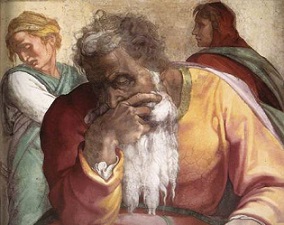
Almost daily I was correcting “Herbie” in class. One day he fired back: “Why are you always picking on me?” I asked him, “Suppose one day you saw a group of younger kids, among which was your little brother, getting in trouble what would you do?” Herbie replied: “I’d get out of my car, grab my little brother and make him come home with me.” To which I responded, “Why did you pick on him?”
Today, we read Jeremiah’s words of mourning and complaint over the destruction of Jerusalem. He poses a question similar to Herbie’s.
“Is Zion loathsome to you?”
Jeremiah wept as he called out to God.
“Let my eyes stream with tears day and night…over the great destruction which overwhelms the virgin daughter of my people, over her incurable wound. If I walk out into the field, look! Those slain by the sword; if I enter a city, look! Those consumed by hunger.”
Jeremiah suffered as he watched his people dying of starvation. Those who tried to escape the city were killed by the Babylonian soldiers who stood outside the walls. It seemed that this was the end of everything for God’s people—their wound was incurable.
Jeremiah continues to question God:
“Have you cast off Judah completely…Why have you struck us a blow that cannot be healed?”
Then the prophet answered his own question:
“We recognize, O Lord, our wickedness, the guilt of our fathers that we have sinned against you.”
The people showed no signs of repenting even at the persistent promptings of the prophets. Because of God’s love for them and his fidelity to his covenant, he had no option other than doing what he did in Noah’s day—sending a flood of destruction on them. And, though it seemed that this people was wiped out forever, God spared a remnant—a “Noah” people who would continue to be part of his plan of bringing his Messiah into the world.
Jeremiah’s prayer turned to supplication.
“For your name’s sake spurn us not, disgrace not the throne of your glory; remember your covenant with us, and break it not.”
God heard this prayer. And though he did not offer a “quick fix” to Jerusalem—for, if he did, they would return back immediately to their rebellious lifestyle—he remembered his covenant. Two generations later, members of the remnant were used by God to help rebuild their fallen city.
Why did God pick on Jerusalem? Because he loved them, and because they were the chosen ones through whom his Son would come into the world. No matter how unfaithful they were to their part of the covenant, God remained faithful to his part.
Mourning begins to grip our own land. We are sad that the conveniences and comforts of days past are gone. When we hear news of riots in our streets, rising cases of the virus, and a spike in suicides we groan as did Jeremiah. Have we, however, come to the point of recognizing the sin that has preceded the calamities of our day? Even in our churches have leaders called people to repentance?
Mary, throughout her appearances, was not afraid to call us to conversion, prayer, and fasting. How many have taken her gentle warnings seriously? Has not the violence done to unborn children, reaped violence in our streets?
God will be faithful to his covenant. Let us not forget to do our part.
“Remember not against us the iniquities of the past; may your compassion quickly come to us, for we are brought very low” (Ps 79:8).
